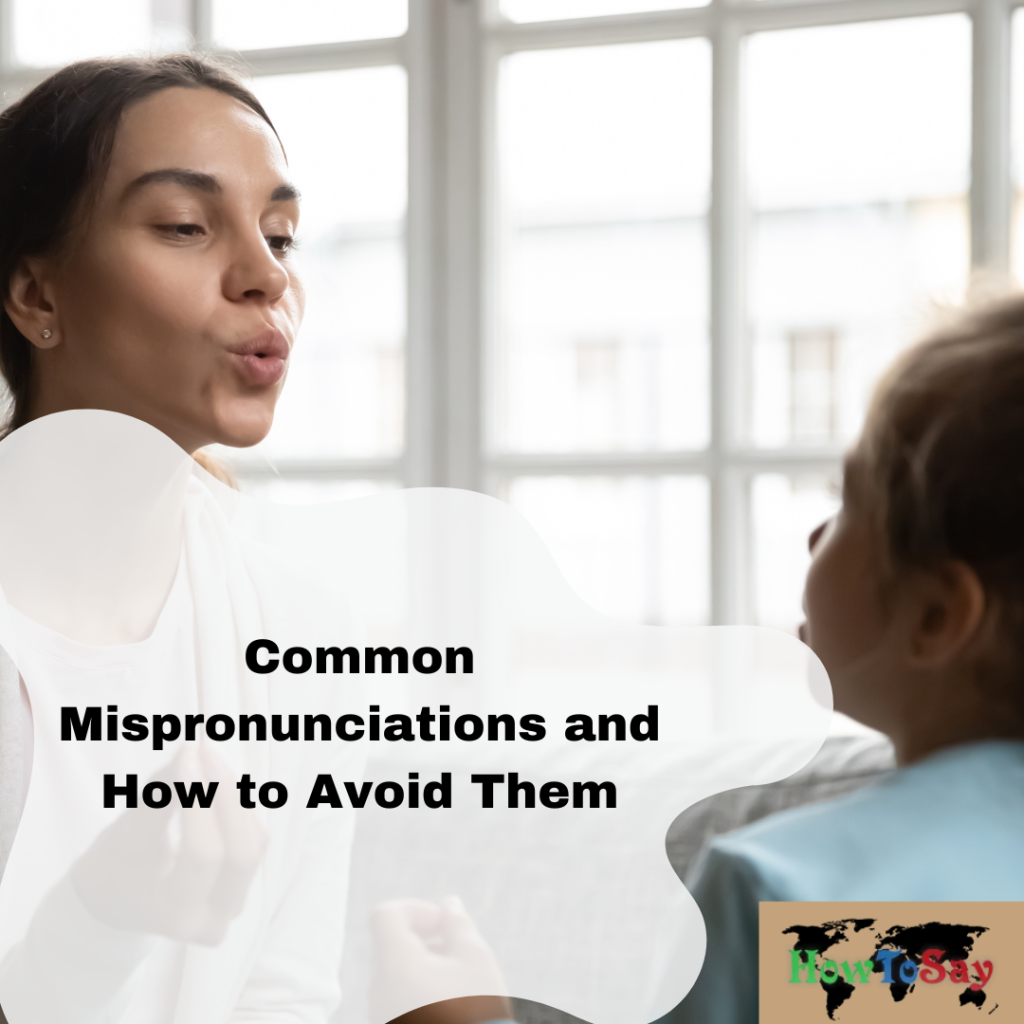Common Mispronunciations and How to Avoid Them

importance of proper pronunciation in communication
Proper pronunciation is an essential aspect of effective communication. When words are pronounced correctly, listeners are able to understand the speaker’s message more efficiently, which helps to avoid misunderstandings. Additionally, proper pronunciation can also enhance the speaker’s credibility, making them appear more confident and competent. In contrast, when words are mispronounced, listeners may have difficulty understanding the speaker and come across as less secure and credible. Furthermore, mispronouncing words can also lead to embarrassment or social faux pas, especially when mispronouncing someone’s name or a word from a different language. Therefore, proper pronunciation can help to improve communication, enhance credibility and avoid misunderstanding, embarrassment, and social faux pas.
Overview of common mispronunciations and why they occur
Common mispronunciations occur for a variety of reasons, including lack of exposure to the correct pronunciation, difficulty distinguishing between similar sounds, and difficulty with the mechanics of producing certain sounds.
Some common mispronunciations in English include words such as “nuclear,” which is often pronounced “nucular,” “library,” which is often pronounced “liberry,” and “February,” which is often pronounced “Feb-yoo-ary.” These mispronunciations can occur because the sounds represented by the letters “c” and “l” in these words are difficult to distinguish for some speakers, or because the speaker is not familiar with the correct pronunciation.
Another common mispronunciation is the “th” sound, which is often pronounced as “f” or “v” especially for non-native speakers. It’s also common for people to mispronounce words with silent letters, such as “gn” in “gnarled” or “knead” and “wr” in “wrap” or “wrist”
In addition, mispronouncing names, whether they are of people or places, is also a common mispronunciation. This can happen when the speaker is not familiar with the correct pronunciation or the origin of the name.
In summary, common mispronunciations occur due to lack of exposure to the correct pronunciation, difficulty distinguishing between similar sounds, difficulty with the mechanics of producing certain sounds, and lack of knowledge about the origin of the word or name.
Common Mispronunciations of English Words
Here are some common mispronunciations of English words:
- “Nuclear” is often pronounced as “nucular.”
- “Library” is often pronounced as “liberry.”
- “February” is often pronounced as “Feb-yoo-ary.”
- “Often” is often pronounced as “offen”
- “Athlete” is often pronounced as “ath-uh-lete”
- “Herb” is often pronounced as “herb”
- “Et cetera” is often pronounced as “ex-setra”
- “Caramel” is often pronounced as “car-muhl”
- “Chauffeur” is often pronounced as “sho-fer”
- “Pneumonia” is often pronounced as “noo-moan-ya”
These mispronunciations can occur because the sounds represented by the letters in these words are difficult to distinguish for some speakers, or because the speaker is not familiar with the correct pronunciation. It’s important to note that, although these are common mispronunciations, they may vary depending on the region and accent, it’s always good to check with a native speaker or a dictionary.
Common Mispronunciations of Names
Here are some common mispronunciations of names:
- “Michelle” is often pronounced as “mee-shell”
- “Caitlyn” is often pronounced as “Kayt-lin”
- “Hailee” is often pronounced as “Hay-lee”
- “Bridgette” is often pronounced as “Bridge-it”
- “Siobhan” is often pronounced as “sho-von”
- “Aoife” is often pronounced as “ee-fuh”
- “Eoin” is often pronounced as “owen”
- “Ximena” is often pronounced as “he-me-na”
- “Qi” is often pronounced as “kye”
- “Nguyen” is often pronounced as “win”
These mispronunciations can occur when the speaker is not familiar with the correct pronunciation or the origin of the name. It’s important to note that names can have different variations and spellings in different regions and cultures, and it’s always good to ask for the correct pronunciation from the person with the name or check with a native speaker.
Common Mispronunciations of Foreign Words
Some common mispronunciations of foreign words include:
- “Cappuccino” – many English speakers tend to stress the first syllable, when it should be stressed on the second syllable.
- “Gif” – it should be pronounced with a hard “g” sound, as in “gift,” not with a soft “g” sound as in “jif.”
- “Croissant” – many English speakers tend to pronounce the first syllable like “crown,” when it should be pronounced like “kwah.”
- “Quiche” – many English speakers tend to pronounce it as “keesh,” when it should be pronounced as “keesh”
- “Alfredo” – Many people say Alfred-o, but it is actually Al-fray-do.
- “Sachertorte” – Many English speakers say Sacher-torte, but it should be pronounced zah-kair-tor-tuh.
- “Hors d’oeuvres” – many English speakers tend to pronounce it as “whore-dervs,” when it should be pronounced “or-derv.”
- “Espresso” – many English speakers say ex-presso, but it should be pronounced ehs-press-o.
These are just a few examples and the correct pronunciation may vary depending on the language and context.